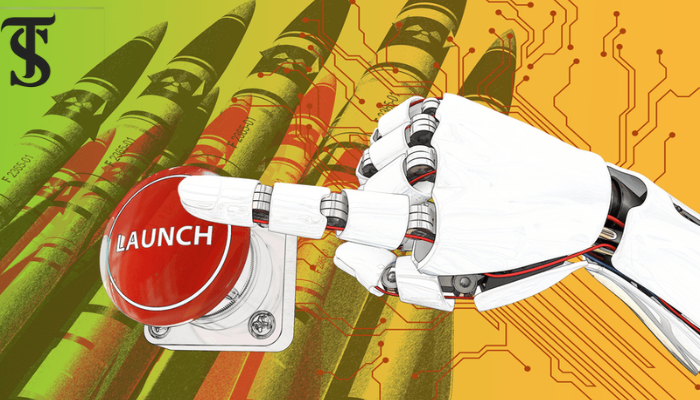Artificial Intelligence: The Death of Creativity

- AI's rapid growth poses potential threats to human creativity, overshadowing traditional problem-solving and imaginative abilities.
- The increasing role of AI in fields like politics, economics, education, and security indicates that it is diminishing human intellectual contributions.
- Though some argue AI lacks genuine creativity, its profound impact on modern society suggests that human ingenuity may face unprecedented challenges ahead.
History unfolds that since the inception of human civilization, society has remained in flux due to human ideas and inventions. Despite prospects, every society has encountered immense challenges; nonetheless, modern threats are quite abstruse and ubiquitous. Artificial intelligence (AI), being the milieu of the modern epoch, is making human existence vulnerable, potentially diminishing the creativity and imagination of people. Noah Harari, an eminent modern historian, anticipates that AI will replace individuals in the near future by declaring that the pre-existing humans will be the last generation, which is driven by human consciousness.
The term artificial intelligence has become an important theme of social discourse for the last few years; nevertheless, it was first defined by John McCarthy, a computer scientist, in 1956, as ‘machines that can perform tasks that are characteristic of human intelligence.’ In simple words, AI is an umbrella term that refers to the development and training of a computer system to make it think and perform various functions, such as decision-making, solving problems, and so forth, just like human beings. It is not an industry or a particular domain; perhaps it enables various industries: scientific research, education, manufacturing, defense, politics, culture, etc. Though AI shares positively in the socio-economic development of society, one cannot overlook the severity of its incumbent threats. Scientists, policymakers, and philosophers are of the view that the overdependence and multifaceted influence of AI on modern men are usurping their creative skills.
People are deemed to be intellectually superior to other creatures for their ability to identify problems. The emergence of AI, notwithstanding, makes the notion skeptical. Various instances in the recent past have proved that AI is more accurate and swift than humans in the identification of problems. AI has predicted the March 2022 up-rises in Sri Lanka, months before its happenings. Moreover, the US security system, backed by AI technology, has also issued red alerts before the visit of Nancy Pelosi, the US speaker, to Taiwan in August 2022: the Island witnessed massive air strikes from the Chinese Air Force later. Moreover, in the health sector, it helps in figuring out the cause of cancer and the recognition of blindness better than physicians. These examples indicate that human creativity is at risk when locating any issue or concern due to the advancement of AI.
Apart from problem identification, AI has also profoundly resolved the concerns. It has been noticed that the new algorithms have handled the intricacies and trouble that seemed beyond human potential. For example, in 2016, Google revealed that the cooling system of its central office, controlled by AI, has reduced the cost by 40 percent compared to the pre-existing system, created by the best minds in the world. The United Nations anticipates that combating global warming and the achievement of UN Sustainable Development Goals (SDGs) are seeming realities because of the contribution of AI in policy implementation and better management. These revolutions are prudently denoting the jeopardization of human imagination.
Research and theoretical approaches have deemed the pivot to materialize human imagination into reality. Traditionally, scientists and scholars design scientific studies to invent new technologies and theories. AI has changed the streak: without any due process of observation and experimentation, computing algorithms inculcate novel products and services. The discovery of Halicin, an antibiotic, in 2020 with the help of AI has proved a wonder for human beings, as scientists have yet failed to invent it by conventional means. The reliance on AI tools in research and development limits the human role in scientific studies. The influence is not only akin to the field of research but also impedes human creativity in the educational realm.
Human beings have always remained cautious about education because of its indispensable role in individual and social development. To carry out the needs and demands of the age, authorities have reformed educational edifice in the past. However, the role of individuals in designing the curriculum has been subdued; AI has taken over the responsibility. Governments across the globe are designing their syllabus with the help of AI applications, which are proving more effective and adaptable. Khan Academy, a non-profit American educational organization, has successfully introduced AI tutors who have opulent knowledge and interesting methods to grab students’ attention for various subjects. Moreover, the extensive use of Chat GPT by the students to complete their assignments and to solve puzzles overwhelmingly circumscribes the human cognitive potential. These illustrations reflect the ubiquitous role of AI in education, subsequently making human creativity vulnerable.
Artificial intelligence is also playing a profound role in developing public opinion and political processes, which have used to be the responsibility of people-political leaders. Novel technological applications are used to promulgate political manifestations and policy measures; even the policies and slogans are formulated by digital tools. Data analysis, divisions of constituencies, evaluation of public pulses and options, and the optimization of political campaigns are effectively accomplished by the use of AI in modern democracies. America, to bring transparency and to ensure the right information regarding its 2024 presidential election, has initiated an AI-driven centralized monitoring system, TrustendInfo2024. Moreover, China has carried out reforms in its core Communist principles to make the system inclusive for AI developers. The inundating role of AI in politics is truly subsiding humans’ contribution and their intellectual share in political maneuvering and policy development.
Economic developments traditionally have remained dependent on the creative abilities of individuals to control the mode of production and means of production and also look after the market supply chain. In the contemporary world, however, these responsibilities have been taken over by the AI industry, owing to its better results and capabilities. Mustafa Suleiman, an AI developer, anticipates in his seminal work, ‘The Coming Wave’, that the AI industry will control the market, business operations, and governmental services shortly. It develops an alarming situation, and the world is quite ambiguous about the role of humans in changing the world, even though the debate is ubiquitous regarding the obsoleteness of human creativity.
Talking about the security paradigm, AI has almost superseded humans. Novelty in the defense industry, strategic planning, upgradation of arsenals, and more importantly, narrative building—an important means of fifth-generation warfare—are primarily controlled by the new tech industry, which once used to be in the hands of humans. Chris Miller, an American writer, has raised questions on the growing role of AI in states’ security by deeming microchips as ‘new oil’ in his masterpiece, ‘The Chip War’. The extraordinary developments are vitiating human wisdom and intellect, denoting that people are zombies in a digital world propelled by lifeless algorithms. The influence is not only noticed in strategic domains but also in redefining global economies.
Despite the profound role of AI in the socio-political realm, a school of thought hitherto believes AI is just a human brilliance, similar to all other inventions, without having any potential to subside human creativity. It cannot think or create on its own but rather imitate and reorganize the data and information given by the external source. Noam Chomsky, an eminent modern philosopher, writes for the ‘New York Times that human minds have great potential to operate with a limited amount of information. He rebukes AI by calling it ‘plagiarism software’ and a tool to avoid copyright laws. It is a healthy debate that yet needs to be ascribed; AI can think or not, but its increasing role in different walks of life has immensely usurped humans’ inputs and their imagination.
To conclude, the significant contributions of AI in the creation and production of different things and ideas indicate that it is the death of human ingenuity. Though in its initial stage, AI has shown wonders in the identification of problems in different sectors and also recommending plausible solutions to resolve them. Moreover, AI has completely transformed the socio-political, economic, and security paradigm of the modern era by overlooking the role of humans. Hence, it is sagacious to say that contemporary society is the age of AI, and its further advancement will be a potential threat to human creativity.

Shahid Hussain
The writer is the fomer editor of The Spine Times.






3 Comments